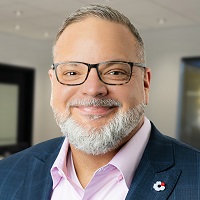Self-Directed Brokerage Accounts: Retirement's Hidden Gem?
SDBAs are often overlooked, but they can offer more flexibility and growth potential inside your 401(k) when actively managed by a professional.


Profit and prosper with the best of Kiplinger's advice on investing, taxes, retirement, personal finance and much more. Delivered daily. Enter your email in the box and click Sign Me Up.
You are now subscribed
Your newsletter sign-up was successful
Want to add more newsletters?

Delivered daily
Kiplinger Today
Profit and prosper with the best of Kiplinger's advice on investing, taxes, retirement, personal finance and much more delivered daily. Smart money moves start here.

Sent five days a week
Kiplinger A Step Ahead
Get practical help to make better financial decisions in your everyday life, from spending to savings on top deals.

Delivered daily
Kiplinger Closing Bell
Get today's biggest financial and investing headlines delivered to your inbox every day the U.S. stock market is open.

Sent twice a week
Kiplinger Adviser Intel
Financial pros across the country share best practices and fresh tactics to preserve and grow your wealth.

Delivered weekly
Kiplinger Tax Tips
Trim your federal and state tax bills with practical tax-planning and tax-cutting strategies.

Sent twice a week
Kiplinger Retirement Tips
Your twice-a-week guide to planning and enjoying a financially secure and richly rewarding retirement

Sent bimonthly.
Kiplinger Adviser Angle
Insights for advisers, wealth managers and other financial professionals.

Sent twice a week
Kiplinger Investing Weekly
Your twice-a-week roundup of promising stocks, funds, companies and industries you should consider, ones you should avoid, and why.

Sent weekly for six weeks
Kiplinger Invest for Retirement
Your step-by-step six-part series on how to invest for retirement, from devising a successful strategy to exactly which investments to choose.
If you’re nearing retirement, you’ve probably been told your investment options inside a 401(k) are limited. The usual advice? Either wait until age 59½ to access your funds, use a hardship withdrawal (if you qualify) or, in some cases, take advantage of the Rule of 55. But what if you didn’t have to wait?
There’s a lesser-known option that gives you far more control and flexibility over your retirement assets: a self-directed brokerage account (SDBA). Despite being available in many employer-sponsored 401(k) plans, SDBAs are one of the most underutilized tools for retirement investing and can unlock the power of your 401(k).
For those who know how to use SDBAs, they can be the key to building a stronger portfolio and optimizing retirement income.
From just $107.88 $24.99 for Kiplinger Personal Finance
Become a smarter, better informed investor. Subscribe from just $107.88 $24.99, plus get up to 4 Special Issues

Sign up for Kiplinger’s Free Newsletters
Profit and prosper with the best of expert advice on investing, taxes, retirement, personal finance and more - straight to your e-mail.
Profit and prosper with the best of expert advice - straight to your e-mail.
Here are some reasons why SDBAs deserve a closer look and how they can give you an edge as you transition into retirement.
What is an SDBA, and why aren't more people using it?
A self-directed brokerage account is a feature within some 401(k) plans that allows investors to go beyond their employer’s limited fund menu. Instead of being stuck with a handful of mutual funds or target-date options, you gain access to a much wider selection of investments, including:
- Stocks
- Exchange-traded funds (ETFs)
- Bonds
- Mutual funds outside your employer’s default options
Sounds like a great deal, right? So why don’t more people take advantage of SDBAs? For one, many employees aren’t even aware this option exists. And even those who do know about them may hesitate to stray from their employer’s pre-selected investments.
There’s also the perception that managing an SDBA is complicated or risky, but that’s where working with a financial professional can make all the difference.
How an SDBA can supercharge your retirement strategy
1. It ditches the one-size-fits-all approach
Most employer-sponsored 401(k) plans are built for the masses, not for individuals with unique retirement goals. The result? A rigid set of investment options that might not be aligned with your specific risk tolerance, retirement timeline or long-term wealth strategy.
An SDBA allows you to break free from this cookie-cutter approach. With access to a broader selection of investments, you can:
- Fine-tune your portfolio based on market conditions and personal risk tolerance
- Reduce reliance on high-fee mutual funds that eat into your returns
- Take advantage of growth opportunities that aren’t available in a traditional 401(k) menu
For seasoned investors or those working with a financial professional, this level of control can be a huge advantage.
2. It keeps your investments working through retirement
Many investors assume their portfolio should become more conservative as they near retirement. But with longer lifespans and increasing costs, this traditional approach can be problematic.
Consider this:
- Today’s 65-year-olds can expect to live 20 to 30-plus more years
- Inflation will erode your purchasing power over time
- A traditional target-date fund may shift too aggressively into bonds, limiting your growth potential
An SDBA lets you customize your retirement investing strategy so you’re not forced into an overly conservative approach. Instead of blindly following a fund’s pre-set allocation, you can:
- Maintain appropriate equity exposure to keep up with inflation
- Balance risk and reward based on your actual needs, not a generic retirement age
- Ensure your portfolio is built for longevity, not just for your first few years of retirement
3. It helps you avoid emotional investment mistakes
The biggest threat to long-term investment success isn’t market volatility — it’s emotional decision-making. During market downturns, investors panic and sell. When stocks are booming, they chase performance. Both behaviors destroy returns over time.
A financial professional working with your SDBA can help you:
- Avoid reactionary mistakes during market swings
- Stick to a disciplined investment strategy
- Ensure your portfolio aligns with your retirement goals instead of short-term emotions
Studies show that working with an adviser can add significant value, not just by optimizing investments, but by helping investors stay on course.
4. It allows you to keep more of what you earn
Here’s the best part: Gains inside an SDBA are still taxed the same way as a traditional 401(k). You get all the benefits of tax-deferred growth while enjoying a broader range of investment choices.
Plus, by working with an expert, you can integrate advanced tax-efficient withdrawal strategies, estate planning and charitable giving techniques — things that simply aren’t possible with a standard 401(k) plan.
Things to keep in mind before using an SDBA
As powerful as an SDBA can be, it’s important to understand the limitations:
- Not all employers offer SDBAs. Check with your plan provider to see if it’s an option
- Some plans cap how much you can transfer. Some employers limit the percentage of your 401(k) balance that can be moved into an SDBA (e.g. 50%)
- SDBAs require more involvement. Unlike a traditional 401(k), an SDBA requires active management, either by you or a trusted adviser
If you’re comfortable making investment decisions or working with a professional to help guide the process, these challenges can be easily managed.
Is an SDBA right for you?
If you’re looking for greater control over your retirement savings, access to better investment opportunities and a strategy that adapts to your needs, an SDBA could be a powerful addition to your retirement plan.
It’s not for everyone. But for those who want more than just the standard 401(k) experience, it’s a compelling alternative that can help maximize retirement wealth and protect your financial future.
Dan Dunkin contributed to this article.
The appearances in Kiplinger were obtained through a PR program. The columnist received assistance from a public relations firm in preparing this piece for submission to Kiplinger.com. Kiplinger was not compensated in any way.
Related Content
- How to Capitalize on Self-Directed Brokerage Accounts
- Can I Hire a Financial Adviser to Manage My 401(k)?
- Seven Reasons to Avoid a Self-Directed IRA
- Can You Build a Retirement Income Plan With Both Risk and Reliability?
- Five Tax Strategies to Help Your Money Last in Retirement
Profit and prosper with the best of Kiplinger's advice on investing, taxes, retirement, personal finance and much more. Delivered daily. Enter your email in the box and click Sign Me Up.

As Founder of Elevated Retirement Group, Inc., Scott Dougan has built a comprehensive retirement planning company focused on helping clients grow and preserve their wealth. Under Scott’s leadership, a team of experienced financial advisers, Certified Financial Planners (CFP®) and CPAs use tax-efficient strategies, professional investment management, income planning and proactive health care planning to help clients feel confident in their financial future — and the legacy they leave behind. Scott has also written a book titled “Exceptional Retirement: Tools and Strategies for Retiring on Your Terms” (click here to request a free copy). You can find Scott on YouTube by clicking here, where he creates educational videos for those near retirement. If you would like to talk to Scott’s team, you can schedule a call by clicking here.
-
 Dow Adds 1,206 Points to Top 50,000: Stock Market Today
Dow Adds 1,206 Points to Top 50,000: Stock Market TodayThe S&P 500 and Nasdaq also had strong finishes to a volatile week, with beaten-down tech stocks outperforming.
-
 Ask the Tax Editor: Federal Income Tax Deductions
Ask the Tax Editor: Federal Income Tax DeductionsAsk the Editor In this week's Ask the Editor Q&A, Joy Taylor answers questions on federal income tax deductions
-
 States With No-Fault Car Insurance Laws (and How No-Fault Car Insurance Works)
States With No-Fault Car Insurance Laws (and How No-Fault Car Insurance Works)A breakdown of the confusing rules around no-fault car insurance in every state where it exists.
-
 Dow Adds 1,206 Points to Top 50,000: Stock Market Today
Dow Adds 1,206 Points to Top 50,000: Stock Market TodayThe S&P 500 and Nasdaq also had strong finishes to a volatile week, with beaten-down tech stocks outperforming.
-
 Why Picking a Retirement Age Feels Impossible (and How to Finally Decide)
Why Picking a Retirement Age Feels Impossible (and How to Finally Decide)Struggling with picking a date? Experts explain how to get out of your head and retire on your own terms.
-
 The Best Precious Metals ETFs to Buy in 2026
The Best Precious Metals ETFs to Buy in 2026Precious metals ETFs provide a hedge against monetary debasement and exposure to industrial-related tailwinds from emerging markets.
-
 For the 2% Club, the Guardrails Approach and the 4% Rule Do Not Work: Here's What Works Instead
For the 2% Club, the Guardrails Approach and the 4% Rule Do Not Work: Here's What Works InsteadFor retirees with a pension, traditional withdrawal rules could be too restrictive. You need a tailored income plan that is much more flexible and realistic.
-
 Retiring Next Year? Now Is the Time to Start Designing What Your Retirement Will Look Like
Retiring Next Year? Now Is the Time to Start Designing What Your Retirement Will Look LikeThis is when you should be shifting your focus from growing your portfolio to designing an income and tax strategy that aligns your resources with your purpose.
-
 I'm a Financial Planner: This Layered Approach for Your Retirement Money Can Help Lower Your Stress
I'm a Financial Planner: This Layered Approach for Your Retirement Money Can Help Lower Your StressTo be confident about retirement, consider building a safety net by dividing assets into distinct layers and establishing a regular review process. Here's how.
-
 Stocks Sink With Alphabet, Bitcoin: Stock Market Today
Stocks Sink With Alphabet, Bitcoin: Stock Market TodayA dismal round of jobs data did little to lift sentiment on Thursday.
-
 Your Adult Kids Are Doing Fine. Is It Time To Spend Some of Their Inheritance?
Your Adult Kids Are Doing Fine. Is It Time To Spend Some of Their Inheritance?If your kids are successful, do they need an inheritance? Ask yourself these four questions before passing down another dollar.